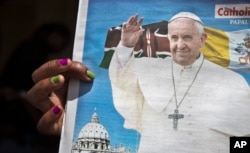Pope Francis begins his first official visit to Africa Wednesday, with stops planned in Kenya, Uganda, and the Central African Republic -- a trip that human rights advocates hope he will use to press for expanded political rights, religious tolerance, and respect for minorities.
The pope makes his first stop in Kenya Wednesday, where he will visit the slum of Kangemi, in keeping with his advocacy for the poor.
He is also expected to highlight the effects of climate change, having previously said the underprivileged are disproportionately affected by changes in weather patterns. And he will meet with leaders of different faiths, in an effort to address Kenya's history of violence between religious groups.
Human Rights Watch has sent a letter to the pope outlining a list of concerns the group hopes he will address during his African visit. It called for the pope to address human rights violations in all three of his destinations.
It outlined specific problems in Kenya, including violence, political manipulation of ethnicity, and crimes by security forces that have never been addressed. The group said these factors fueled Kenya's electoral crisis of 2007 and 2008 that left more than a thousand people dead and hundreds of thousands displaced.
HRW also called for the pope to highlight discrimination against Kenya's ethnic Somali population, which it says has escalated into incidents of serious violence by Kenyan security forces.
The letter called on the pope to speak out against violent attacks on sexual and gender minorities, specifically mob attacks instigated by religious leaders.
And the rights group asked the pope to consider the way church policy, particularly on contraception, negatively affects women and girls. It called on the pope to reiterate his message of forgiveness for women who have had abortions, meet with women living with HIV, and meet with public health practitioners to discuss reproductive health care for women.
The pope makes his five-day trip at a time of heightened security concerns worldwide. Thousands of security personnel are to be deployed in the cities he will visit during his African tour.






